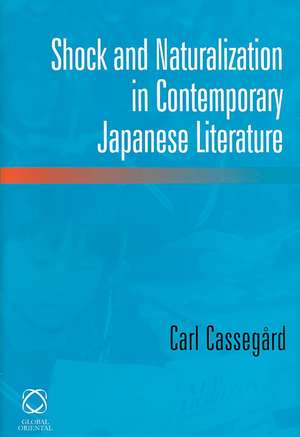Shock and Naturalization in Contemporary Japanese Literature
Autor Carl Cassegården Limba Engleză Hardback – 28 mar 2007
Preț: 406.22 lei
Nou
Puncte Express: 609
Preț estimativ în valută:
77.75€ • 80.85$ • 65.06£
77.75€ • 80.85$ • 65.06£
Carte indisponibilă temporar
Doresc să fiu notificat când acest titlu va fi disponibil:
Se trimite...
Preluare comenzi: 021 569.72.76
Specificații
ISBN-13: 9781905246298
ISBN-10: 1905246293
Pagini: 240
Dimensiuni: 140 x 216 x 19 mm
Greutate: 0 kg
Ediția:New.
Editura: Brill
Colecția Brill
ISBN-10: 1905246293
Pagini: 240
Dimensiuni: 140 x 216 x 19 mm
Greutate: 0 kg
Ediția:New.
Editura: Brill
Colecția Brill
Cuprins
Preface; Introduction; 1. Modernity and Shock; 2. Second Nature and Revolt; 3. Naturalized Modernity; 4. Strategies for the Good Life; 5. Kawabata Yasunari: Shock and the Reunion with Inner Nature; 6. Abe Kobo and the Triumph of Shock; 7. Murakami Haruki: Loneliness and Waiting; 8. Murakami Ryu: Boredom and the Nostalgia for Shock; 9. Nature and the Critique of Myth; Bibliography; Index
Notă biografică
Carl Cassegård is a Post-doctoral Fellow at the University of Göteborg, Dept. of Oriental and African Languages. Shock and Naturalization in Contemporary Japanese Literature has been highly commended by several leading scholars, including Professor Michael Löwy who was especially interested in the author’s approach to ‘literature as sociology’.
